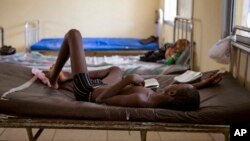An anti-malaria campaign gets underway in Sierra Leone Friday. The U.N. Children’s Fund, which is spearheading this campaign, says reducing malaria cases also will help the fight against Ebola.
This is the peak of the malaria season and many people are expected to fall ill and die from the disease. The campaign aims to reach around 2.4 million people with anti-malarial drugs.
UNICEF reports more than 9,300 trained community health workers will go door-to-door in areas of Sierra Leone where the risk of Ebola is highest. UNICEF crisis communications chief Sarah Crowe says the health workers will distribute anti-malarial drugs to everyone six months and older.
“The point of this is really to reduce, obviously, malaria but also to ease the strain on the health services of people who are coming in with symptoms of malaria, because as you know malaria mimics a lot of the early symptoms of Ebola," explained Crowe. "So, by giving out these drugs…it really aims to as well expose the real Ebola cases.”
Malaria symptoms of fever, headache, and aching joints are similar to Ebola in its early stages. The disease is often misdiagnosed. This causes confusion among patients and health care workers and people with malaria often are referred to Ebola Treatment Units.
UNICEF says malaria tablets being distributed will reduce the number of people exhibiting a high fever. This, it says, will result in fewer patients having to be screened for Ebola and put into isolation units. It also will reduce the risk of malaria patients contracting Ebola.
Crowe tells VOA a community-based approach is the best way of combating these dual diseases.
“The key to the approach is really that we know we cannot treat our way out of Ebola," said Crowe. "So, the community approach, by building up the response at community level through community care centers is really critical. And, in these community care centers, there is a double approach with a triage system where on the one hand, you have the Ebola cases that are obvious and then on the other, it is other concerns, other health-related, well malaria-related-any of those kinds of other diseases that people have.”
Latest figures from the World Health Organization put the number of confirmed cases of Ebola in Sierra Leone at 7,420, including 1,609 deaths. The UNICEF supported anti-malarial campaign will go on for several weeks. The agency says a second round of drug distribution will take place in January 2015.










